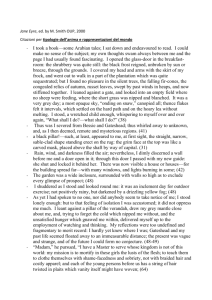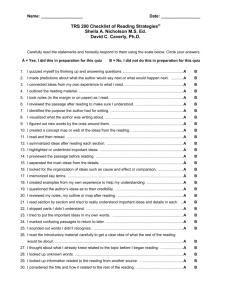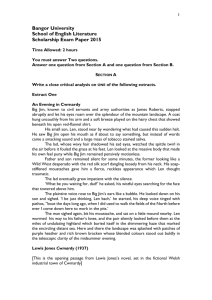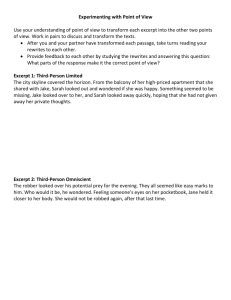Jane-Eyre-Passages-o..
advertisement
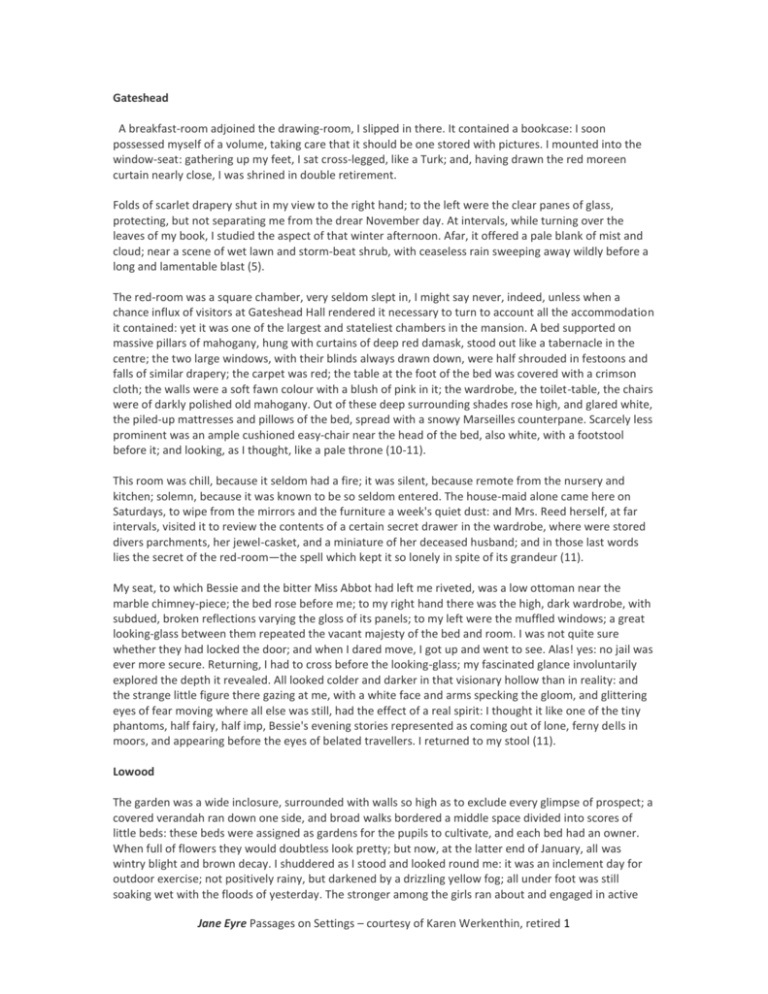
Gateshead A breakfast-room adjoined the drawing-room, I slipped in there. It contained a bookcase: I soon possessed myself of a volume, taking care that it should be one stored with pictures. I mounted into the window-seat: gathering up my feet, I sat cross-legged, like a Turk; and, having drawn the red moreen curtain nearly close, I was shrined in double retirement. Folds of scarlet drapery shut in my view to the right hand; to the left were the clear panes of glass, protecting, but not separating me from the drear November day. At intervals, while turning over the leaves of my book, I studied the aspect of that winter afternoon. Afar, it offered a pale blank of mist and cloud; near a scene of wet lawn and storm-beat shrub, with ceaseless rain sweeping away wildly before a long and lamentable blast (5). The red-room was a square chamber, very seldom slept in, I might say never, indeed, unless when a chance influx of visitors at Gateshead Hall rendered it necessary to turn to account all the accommodation it contained: yet it was one of the largest and stateliest chambers in the mansion. A bed supported on massive pillars of mahogany, hung with curtains of deep red damask, stood out like a tabernacle in the centre; the two large windows, with their blinds always drawn down, were half shrouded in festoons and falls of similar drapery; the carpet was red; the table at the foot of the bed was covered with a crimson cloth; the walls were a soft fawn colour with a blush of pink in it; the wardrobe, the toilet-table, the chairs were of darkly polished old mahogany. Out of these deep surrounding shades rose high, and glared white, the piled-up mattresses and pillows of the bed, spread with a snowy Marseilles counterpane. Scarcely less prominent was an ample cushioned easy-chair near the head of the bed, also white, with a footstool before it; and looking, as I thought, like a pale throne (10-11). This room was chill, because it seldom had a fire; it was silent, because remote from the nursery and kitchen; solemn, because it was known to be so seldom entered. The house-maid alone came here on Saturdays, to wipe from the mirrors and the furniture a week's quiet dust: and Mrs. Reed herself, at far intervals, visited it to review the contents of a certain secret drawer in the wardrobe, where were stored divers parchments, her jewel-casket, and a miniature of her deceased husband; and in those last words lies the secret of the red-room—the spell which kept it so lonely in spite of its grandeur (11). My seat, to which Bessie and the bitter Miss Abbot had left me riveted, was a low ottoman near the marble chimney-piece; the bed rose before me; to my right hand there was the high, dark wardrobe, with subdued, broken reflections varying the gloss of its panels; to my left were the muffled windows; a great looking-glass between them repeated the vacant majesty of the bed and room. I was not quite sure whether they had locked the door; and when I dared move, I got up and went to see. Alas! yes: no jail was ever more secure. Returning, I had to cross before the looking-glass; my fascinated glance involuntarily explored the depth it revealed. All looked colder and darker in that visionary hollow than in reality: and the strange little figure there gazing at me, with a white face and arms specking the gloom, and glittering eyes of fear moving where all else was still, had the effect of a real spirit: I thought it like one of the tiny phantoms, half fairy, half imp, Bessie's evening stories represented as coming out of lone, ferny dells in moors, and appearing before the eyes of belated travellers. I returned to my stool (11). Lowood The garden was a wide inclosure, surrounded with walls so high as to exclude every glimpse of prospect; a covered verandah ran down one side, and broad walks bordered a middle space divided into scores of little beds: these beds were assigned as gardens for the pupils to cultivate, and each bed had an owner. When full of flowers they would doubtless look pretty; but now, at the latter end of January, all was wintry blight and brown decay. I shuddered as I stood and looked round me: it was an inclement day for outdoor exercise; not positively rainy, but darkened by a drizzling yellow fog; all under foot was still soaking wet with the floods of yesterday. The stronger among the girls ran about and engaged in active Jane Eyre Passages on Settings – courtesy of Karen Werkenthin, retired 1 games, but sundry pale and thin ones herded together for shelter and warmth in the verandah; and amongst these, as the dense mist penetrated to their shivering frames, I heard frequently the sound of a hollow cough (41-42). I discovered, too, that a great pleasure, an enjoyment which the horizon only bounded, lay all outside the high and spike-guarded walls of our garden: this pleasure consisted in prospect of noble summits girdling a great hill-hollow, rich in verdure and shadow; in a bright beck, full of dark stones and sparkling eddies. How different had this scene looked when I viewed it laid out beneath the iron sky of winter, stiffened in frost, shrouded with snow!—when mists as chill as death wandered to the impulse of east winds along those purple peaks, and rolled down "ing" and holm till they blended with the frozen fog of the beck! That beck itself was then a torrent, turbid and curbless: it tore asunder the wood, and sent a raving sound through the air, often thickened with wild rain or whirling sleet; and for the forest on its banks, THAT showed only ranks of skeletons (66). That forest-dell, where Lowood lay, was the cradle of fog and fog- bred pestilence; which, quickening with the quickening spring, crept into the Orphan Asylum, breathed typhus through its crowded schoolroom and dormitory, and, ere May arrived, transformed the seminary into an hospital (66). Several wealthy and benevolent individuals in the county subscribed largely for the erection of a more convenient building in a better situation; new regulations were made; improvements in diet and clothing introduced; the funds of the school were intrusted to the management of a committee. Mr. Brocklehurst, who, from his wealth and family connections, could not be overlooked, still retained the post of treasurer; but he was aided in the discharge of his duties by gentlemen of rather more enlarged and sympathising minds: his office of inspector, too, was shared by those who knew how to combine reason with strictness, comfort with economy, compassion with uprightness. The school, thus improved, became in time a truly useful and noble institution. I remained an inmate of its walls, after its regeneration, for eight years: six as pupil, and two as teacher; and in both capacities I bear my testimony to its value and importance (72-73). I went to my window, opened it, and looked out. There were the two wings of the building; there was the garden; there were the skirts of Lowood; there was the hilly horizon. My eye passed all other objects to rest on those most remote, the blue peaks; it was those I longed to surmount; all within their boundary of rock and heath seemed prison-ground, exile limits. I traced the white road winding round the base of one mountain, and vanishing in a gorge between two; how I longed to follow it farther! I recalled the time when I had travelled that very road in a coach; I remembered descending that hill at twilight; an age seemed to have elapsed since the day which brought me first to Lowood, and I had never quitted it since. My vacations had all been spent at school: Mrs. Reed had never sent for me to Gateshead; neither she nor any of her family had ever been to visit me. I had had no communication by letter or message with the outer world: school-rules, school-duties, school-habits and notions, and voices, and faces, and phrases, and costumes, and preferences, and antipathies—such was what I knew of existence. And now I felt that it was not enough; I tired of the routine of eight years in one afternoon. I desired liberty; for liberty I gasped; for liberty I uttered a prayer; it seemed scattered on the wind then faintly blowing. I abandoned it and framed a humbler supplication; for change, stimulus: that petition, too, seemed swept off into vague space: "Then," I cried, half desperate, "grant me at least a new servitude!" (74). Thornfield Hall I thanked her for her considerate choice, and as I really felt fatigued with my long journey, expressed my readiness to retire. She took her candle, and I followed her from the room. First she went to see if the hall-door was fastened; having taken the key from the lock, she led the way upstairs. The steps and banisters were of oak; the staircase window was high and latticed; both it and the long gallery into which the bedroom doors opened looked as if they belonged to a church rather than a house. A very chill and Jane Eyre Passages on Settings – courtesy of Karen Werkenthin, retired 2 vault- like air pervaded the stairs and gallery, suggesting cheerless ideas of space and solitude; and I was glad, when finally ushered into my chamber, to find it of small dimensions, and furnished in ordinary, modern style (85). The chamber looked such a bright little place to me as the sun shone in between the gay blue chintz window curtains, showing papered walls and a carpeted floor, so unlike the bare planks and stained plaster of Lowood, that my spirits rose at the view. Externals have a great effect on the young: I thought that a fairer era of life was beginning for me, one that was to have its flowers and pleasures, as well as its thorns and toils. My faculties, roused by the change of scene, the new field offered to hope, seemed all astir. I cannot precisely define what they expected, but it was something pleasant: not perhaps that day or that month, but at an indefinite future period (85-86). Traversing the long and matted gallery, I descended the slippery steps of oak; then I gained the hall: I halted there a minute; I looked at some pictures on the walls (one, I remember, represented a grim man in a cuirass, and one a lady with powdered hair and a pearl necklace), at a bronze lamp pendent from the ceiling, at a great clock whose case was of oak curiously carved, and ebon black with time and rubbing. Everything appeared very stately and imposing to me; but then I was so little accustomed to grandeur. The hall-door, which was half of glass, stood open; I stepped over the threshold. It was a fine autumn morning; the early sun shone serenely on embrowned groves and still green fields; advancing on to the lawn, I looked up and surveyed the front of the mansion. It was three storeys high, of proportions not vast, though considerable: a gentleman's manor-house, not a nobleman's seat: battlements round the top gave it a picturesque look. Its grey front stood out well from the background of a rookery, whose cawing tenants were now on the wing: they flew over the lawn and grounds to alight in a great meadow, from which these were separated by a sunk fence, and where an array of mighty old thorn trees, strong, knotty, and broad as oaks, at once explained the etymology of the mansion's designation. Farther off were hills: not so lofty as those round Lowood, nor so craggy, nor so like barriers of separation from the living world; but yet quiet and lonely hills enough, and seeming to embrace Thornfield with a seclusion I had not expected to find existent so near the stirring locality of Millcote. A little hamlet, whose roofs were blent with trees, straggled up the side of one of these hills; the church of the district stood nearer Thornfield: its old tower-top looked over a knoll between the house and gates (86-87). Mrs. Fairfax stayed behind a moment to fasten the trap-door; I, by drift of groping, found the outlet from the attic, and proceeded to descend the narrow garret staircase. I lingered in the long passage to which this led, separating the front and back rooms of the third storey: narrow, low, and dim, with only one little window at the far end, and looking, with its two rows of small black doors all shut, like a corridor in some Bluebeard's castle (93). Nature I touched the heath, it was dry, and yet warm with the beat of the summer day. I looked at the sky; it was pure: a kindly star twinkled just above the chasm ridge. The dew fell, but with propitious softness; no breeze whispered. Nature seemed to me benign and good; I thought she loved me, outcast as I was; and I, who from man could anticipate only mistrust, rejection, insult, clung to her with filial fondness. To-night, at least, I would be her guest, as I was her child: my mother would lodge me without money and without price. I had one morsel of bread yet: the remnant of a roll I had bought in a town we passed through at noon with a stray penny—my last coin. I saw ripe bilberries gleaming here and there, like jet beads in the heath: I gathered a handful and ate them with the bread. My hunger, sharp before, was, if not satisfied, appeased by this hermit's meal. I said my evening prayers at its conclusion, and then chose my couch (284-285). Beside the crag the heath was very deep: when I lay down my feet were buried in it; rising high on each side, it left only a narrow space for the night-air to invade. I folded my shawl double, and spread it over Jane Eyre Passages on Settings – courtesy of Karen Werkenthin, retired 3 me for a coverlet; a low, mossy swell was my pillow. Thus lodged, I was not, at least—at the commencement of the night, cold. My rest might have been blissful enough, only a sad heart broke it. It plained of its gaping wounds, its inward bleeding, its riven chords. It trembled for Mr. Rochester and his doom; it bemoaned him with bitter pity; it demanded him with ceaseless longing; and, impotent as a bird with both wings broken, it still quivered its shattered pinions in vain attempts to seek him. Worn out with this torture of thought, I rose to my knees. Night was come, and her planets were risen: a safe, still night: too serene for the companionship of fear. We know that God is everywhere; but certainly we feel His presence most when His works are on the grandest scale spread before us; and it is in the unclouded night-sky, where His worlds wheel their silent course, that we read clearest His infinitude, His omnipotence, His omnipresence. I had risen to my knees to pray for Mr. Rochester. Looking up, I, with tear-dimmed eyes, saw the mighty Milky-way. Remembering what it was—what countless systems there swept space like a soft trace of light—I felt the might and strength of God. Sure was I of His efficiency to save what He had made: convinced I grew that neither earth should perish, nor one of the souls it treasured. I turned my prayer to thanksgiving: the Source of Life was also the Saviour of spirits. Mr. Rochester was safe; he was God's, and by God would he be guarded. I again nestled to the breast of the hill; and ere long in sleep forgot sorrow (285). Moor House (Marsh End) Having crossed the marsh, I saw a trace of white over the moor. I approached it; it was a road or a track: it led straight up to the light, which now beamed from a sort of knoll, amidst a clump of trees—firs, apparently, from what I could distinguish of the character of their forms and foliage through the gloom. My star vanished as I drew near: some obstacle had intervened between me and it. I put out my hand to feel the dark mass before me: I discriminated the rough stones of a low wall—above it, something like palisades, and within, a high and prickly hedge. I groped on. Again a whitish object gleamed before me: it was a gate—a wicket; it moved on its hinges as I touched it. On each side stood a sable bush-holly or yew (291). Entering the gate and passing the shrubs, the silhouette of a house rose to view, black, low, and rather long; but the guiding light shone nowhere. All was obscurity. Were the inmates retired to rest? I feared it must be so. In seeking the door, I turned an angle: there shot out the friendly gleam again, from the lozenged panes of a very small latticed window, within a foot of the ground, made still smaller by the growth of ivy or some other creeping plant, whose leaves clustered thick over the portion of the house wall in which it was set. The aperture was so screened and narrow, that curtain or shutter had been deemed unnecessary; and when I stooped down and put aside the spray of foliage shooting over it, I could see all within. I could see clearly a room with a sanded floor, clean scoured; a dresser of walnut, with pewter plates ranged in rows, reflecting the redness and radiance of a glowing peat-fire. I could see a clock, a white deal table, some chairs. The candle, whose ray had been my beacon, burnt on the table; and by its light an elderly woman, somewhat rough-looking, but scrupulously clean, like all about her, was knitting a stocking (292). Ferndean The manor-house of Ferndean was a building of considerable antiquity, moderate size, and no architectural pretensions, deep buried in a wood. I had heard of it before. Mr. Rochester often spoke of it, and sometimes went there. His father had purchased the estate for the sake of the game covers. He would have let the house, but could find no tenant, in consequence of its ineligible and insalubrious site. Ferndean then remained uninhabited and unfurnished, with the exception of some two or three rooms fitted up for the accommodation of the squire when he went there in the season to shoot. Jane Eyre Passages on Settings – courtesy of Karen Werkenthin, retired 4 To this house I came just ere dark on an evening marked by the characteristics of sad sky, cold gale, and continued small penetrating rain. The last mile I performed on foot, having dismissed the chaise and driver with the double remuneration I had promised. Even when within a very short distance of the manor- house, you could see nothing of it, so thick and dark grew the timber of the gloomy wood about it. Iron gates between granite pillars showed me where to enter, and passing through them, I found myself at once in the twilight of close-ranked trees. There was a grass-grown track descending the forest aisle between hoar and knotty shafts and under branched arches. I followed it, expecting soon to reach the dwelling; but it stretched on and on, it would far and farther: no sign of habitation or grounds was visible. I thought I had taken a wrong direction and lost my way. The darkness of natural as well as of sylvan dusk gathered over me. I looked round in search of another road. There was none: all was interwoven stem, columnar trunk, dense summer foliage—no opening anywhere. I proceeded: at last my way opened, the trees thinned a little; presently I beheld a railing, then the house—scarce, by this dim light, distinguishable from the trees; so dank and green were its decaying walls. Entering a portal, fastened only by a latch, I stood amidst a space of enclosed ground, from which the wood swept away in a semicircle. There were no flowers, no garden-beds; only a broad gravel-walk girdling a grass-plat, and this set in the heavy frame of the forest. The house presented two pointed gables in its front; the windows were latticed and narrow: the front door was narrow too, one step led up to it. The whole looked, as the host of the Rochester Arms had said, "quite a desolate spot." It was as still as a church on a week-day: the pattering rain on the forest leaves was the only sound audible in its vicinage (378-379). Jane Eyre Passages on Settings – courtesy of Karen Werkenthin, retired 5
